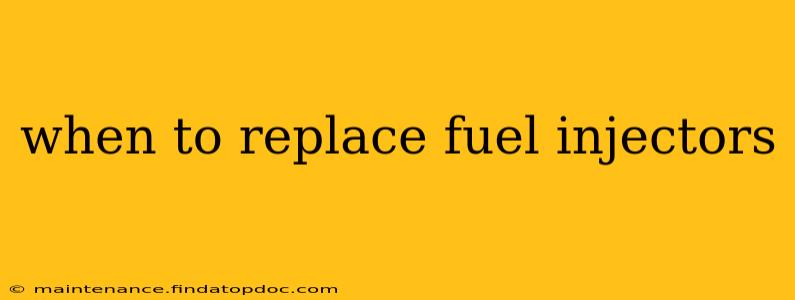Fuel injectors are vital components of your vehicle's engine, responsible for precisely delivering fuel into the combustion chamber. While they're built to last, they eventually wear out and require replacement. Knowing the signs of failing fuel injectors can save you from costly engine damage and ensure optimal vehicle performance. This guide will help you understand when it's time to replace your fuel injectors.
What are the Signs of Bad Fuel Injectors?
Several symptoms indicate that your fuel injectors might be failing. Ignoring these signs can lead to further engine problems. Let's explore the most common ones:
-
Rough Idle: A rough or shaky idle, especially noticeable at stoplights, is a key indicator. This is because inconsistent fuel delivery causes uneven combustion.
-
Poor Fuel Economy: If you notice a significant drop in your gas mileage without any other apparent reason, failing fuel injectors could be the culprit. Inefficient fuel injection leads to wasted fuel.
-
Engine Misfires: Misfires are characterized by a sputtering or knocking sound from the engine, accompanied by a loss of power. This happens when one or more injectors fail to deliver the correct amount of fuel to a cylinder.
-
Hard Starting: Difficulty starting your engine, especially in cold weather, can be caused by insufficient fuel delivery from clogged or malfunctioning injectors.
-
Black Smoke from Exhaust: Excessive black smoke coming from the exhaust pipe often indicates a rich fuel mixture, which can be caused by fuel injectors delivering too much fuel.
-
Hesitation or Stuttering During Acceleration: If your car hesitates or stutters when you accelerate, it might be struggling to receive the proper amount of fuel, hinting at faulty injectors.
How Long Do Fuel Injectors Typically Last?
The lifespan of fuel injectors varies depending on several factors, including vehicle make and model, driving habits, and fuel quality. Generally, fuel injectors can last between 100,000 to 200,000 miles. However, some may fail much sooner due to poor maintenance or harsh driving conditions.
How Much Does it Cost to Replace Fuel Injectors?
The cost of replacing fuel injectors varies considerably based on factors such as:
- Vehicle Make and Model: Some vehicles require more labor-intensive injector replacement procedures than others.
- Number of Injectors Needing Replacement: Replacing a single injector is less expensive than replacing all of them.
- Labor Costs: Labor rates vary widely depending on your location and the chosen repair shop.
- Injector Cost: The cost of individual fuel injectors differs based on brand and quality.
It's best to get a quote from a qualified mechanic to determine the exact cost for your vehicle.
Can I Repair Fuel Injectors Instead of Replacing Them?
While some minor issues might be addressed through cleaning or servicing, a completely malfunctioning fuel injector typically requires replacement rather than repair. Cleaning can sometimes temporarily improve performance, but a severely damaged injector usually needs to be replaced for reliable operation.
What Happens If I Don't Replace Bad Fuel Injectors?
Ignoring faulty fuel injectors can lead to a cascade of engine problems. These can range from decreased fuel efficiency and performance to serious engine damage, requiring costly repairs or even engine replacement. Consistent misfires can cause catalytic converter damage, further increasing repair expenses.
How Often Should I Have My Fuel Injectors Checked?
While there's no set schedule for fuel injector inspections, it's recommended to have them checked during routine maintenance or if you notice any of the symptoms mentioned above. A qualified mechanic can perform a diagnostic test to assess the condition of your fuel injectors.
This guide provides a comprehensive overview of when to replace fuel injectors. Remember, regular vehicle maintenance and prompt attention to warning signs can help prevent costly repairs and ensure your vehicle runs smoothly for years to come. If you suspect a problem with your fuel injectors, consult a qualified mechanic for diagnosis and repair.
